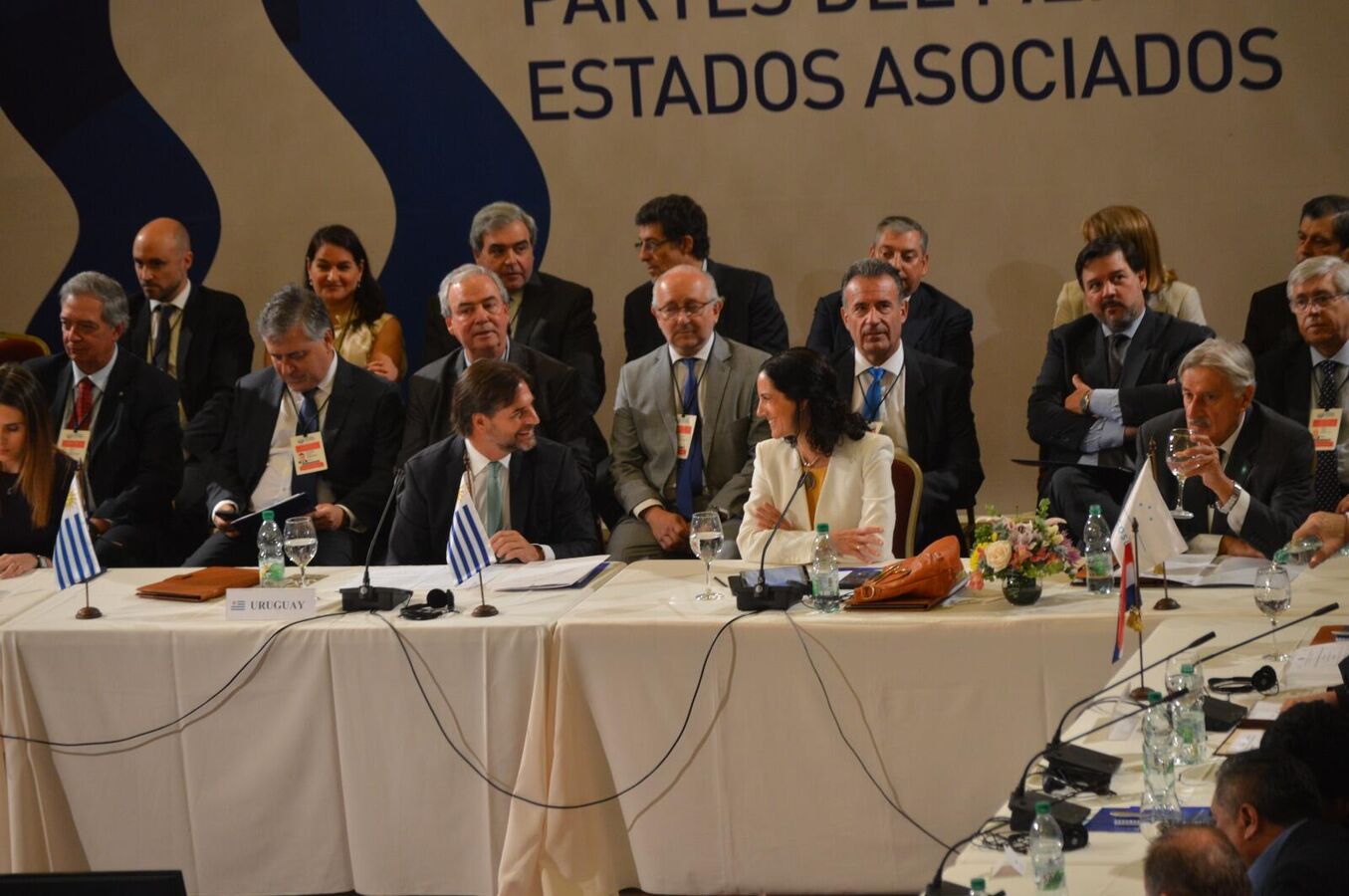Uruguay intends to negotiate with China and the Trans-Pacific Agreement in conjunction with the Southern Common Market (Mercosur), declared President Luis Lacalle Pou during the regional bloc summit in Montevideo.
“When we presented to the member states that we started negotiations with China, we did it because we are negotiating to start an FTA, but we are looking to the side and we asked Brazil, Argentina and Paraguay, are we all going together? The same with Turkey and with the Trans-Pacific. Here it is not about rupture. I promise that I will not use that word anymore. It is about resolving tensions abroad,” said Lacalle Pou.
He indicated that it is “much better” if Uruguay “goes in a group”, but warned that his country is not willing to “stand still.”

“Personally, what we are willing to do is move forward and not wait, whoever stands still falls behind. The proposal is to terminate the agreement with the European Union (EU) on which we have had a critical vision not because of the Mercosur’s attitude but because we have received elements from the EU that would be making this situation more complex. We cannot spend 25 years to sign an agreement, it is not serious, that is why we intend to continue expanding Uruguay’s possibilities,” he said.
He added that South America is one of the most protectionist regions on the planet.
“We are one of the most protectionist areas in the world. We are facing an impressive geopolitical panorama. The countries that are the most closed are the ones that are opening up the most to the world. Free-market countries today are protecting themselves. What is this going to do to the region?” Lacalle wondered.
Uruguay promotes the idea of making bilateral agreements outside the block, something that is rejected by Argentina, Brazil and Paraguay.
“Uruguay receives this summit very willingly and with rational optimism. (…) Mercosur came here with difficulties, with all ideologies, today we have to give it a push (…) The vocation cannot be that this region feeds the world. It is a region that exports intelligence and knowledge more and more every day, it has to enter the world on an equal opportunity with those who do not pay tariffs. No one can deny that. That is the anxiety generated on us,” added Lacalle.
For her part, the Vice Minister of Foreign Affairs of Uruguay Carolina Ache pointed out that Uruguay’s projection towards the world is through Mercosur.
“Uruguay conceives its projection towards the rest of the world from a first level that consists of a strong and solid Mercosur”, affirmed Ache during the Mercosur summit, which is being held in Montevideo.
The official considered that during the pro tempore presidency of Uruguay the current situation of the bloc was diagnosed.
“We have proposed that we question ourselves to what degree we are functioning as a platform for international insertion, that we value the needs of each country. The non-tariff zone has restrictions that impact small economies. An attempt was made to improve the free trade zone, At the same time, we promote other issues, of which the green agenda and sustainability stand out,” she added.
She considered that Uruguay tried to promote a pragmatic vision that allows reaching more trade agreements.
The EU and Mercosur signed an agreement in June 2019, two decades after the start of the negotiations, but it did not enter into force because it requires the ratification of all member countries and there are very different positions.
The Presidency of Uruguay announced that it submitted the request to enter the Trans-Pacific Agreement within the framework of the international insertion strategy drawn up by the current administration.
The Comprehensive and Progressive Trans-Pacific Partnership Agreement, which seeks to promote greater regional economic integration and cooperation among its members, was signed in 2018 and is made up of Australia, Canada, Japan, Malaysia, Mexico, New Zealand, Peru, Singapore, Vietnam, Brunei and Chile.
Since his inauguration, in March 2020, Lacalle Pou insists that current international law enables Uruguay “to make progress in making Mercosur more flexible” and that his country needs to “open up to the world.”
In mid-July, the president announced that his government formally began negotiations with China for a FTA (Free Trade Agreement), after a “positive conclusion” of the feasibility study.
The negotiations between Montevideo and Beijing caused discomfort in some of the group’s partners, especially Argentina, considering that member countries cannot sign trade agreements unilaterally.
CONTROVERSIES WITHIN THE BLOC
Luis Lacalle Pou admitted that there are tensions within Mercosur.
“It would be very difficult to approach Mercosur with a head from the 90s. That should inspire us and allow us to look at what is happening at full speed (…) It is true that we arrived today with tensions, the lives of human beings are about to resolve tensions, to seek balance,” he stressed.
Lacalle explained that the objective of his country’s foreign policy is to open up to the world and stressed that if they go “in a group it is much better.”
During the preparatory meeting for the Mercosur summit, held on December 5, Uruguay was left alone in its attempts to make the bloc more flexible in order to make bilateral agreements with other countries.
The foreign ministers of Argentina, Brazil and Paraguay expressed concern about Uruguay’s position and asked that the rules of the bloc’s historical functioning be respected.
However, the government of Lacalle Pou insists on the idea that Mercosur’s position “failed” and calls for more agreements with other countries.
The Uruguayan Foreign Minister, Francisco Bustillo, did not skimp on criticizing the bloc while his Argentine counterpart, Santiago Cafiero, came out to discuss every argument made by Montevideo.
But the height of the tension came when Cafiero implicitly warned Uruguay that if it continued with its claims there would be a danger of a “rupture” in Mercosur.
With information from Sputnik

